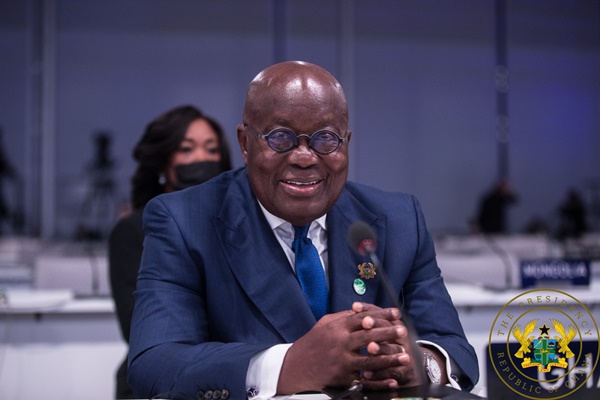
President Nana Addo Dankwa Akufo-Addo has pressed African nations to increase nationally determined contributions and adaptation plans to safeguard the ocean’s capacity to regenerate.
This would ensure that the ocean continues to deliver substantial economic, environmental, and social value for the continents’ development.
The President made the call when he opened the National Blue Economy Summit (NBES) in Accra on Wednesday.
The summit is on the theme “Our Ocean’s Health, Our Prosperity, Our Planet’s Security.” It brought together blue economy experts to brainstorm and drive policy on the marine ecosystem.
The objective of the two-day summit is to reverse marine pollution and enhance the management and restoration of the marine and coastal ecosystem of the nation.
It also aims to mobilise transformative ocean action to achieve the United Nations (UN) Sustainable Development Goals (SDGs).
Blue economy refers to the sustainable use of coastal and marine resources for economic growth and improved livelihoods and jobs.
President Akufo-Addo explained that the health of the planet and the health of the peoples of the world are linked to the health of oceans, which are now under pressure from unsustainable fishing practices, pollution, marine debris, habitat loss, ocean acidification and climate change.
He told the gathering that the ocean, the lifeblood of the planet, generated half of the world’s oxygen supply, drove the global economy through transport trade, and provided food and sustenance, mineral resources, energy, employment, and livelihoods, as well as cultural recreation value for billions of people around the world.
“The consequences of neglecting the ocean are dire not just for the millions of people who depend on it for their livelihoods, but also for the health of our planet.
“There is therefore the need to preserve and protect the ocean and all its resources…We need to take decisive actions now to safeguard the ocean’s capacity to regenerate and continue to deliver substantial economic, environmental and social value for our development.”
President Akufo-Addo noted that in Ghana’s instance, its coastal exclusive economic zone stretches 218,00 square kilometres, and is home to over 7.5 million people.
Sadly, Ghana’s coastal and marine resources face significant threats in the form of biodiversity loss, pollution, ocean dumping, overfishing, illegal and unreported and unregulated fishing, piracy, and trafficking.
Those threats, the President said, “are avoidable” and the inability to deal with them held consequences for the livelihoods of many people, affecting food security prospects, critical infrastructure, important ecosystems and the security and stability of the entire African region.
“Like many other coastal African countries, the blue economy provides us with food, employment, and income. For instance, some 10 per cent of Ghana’s workforce is employed in the fishing sector which also accounts for 4.5 per cent of the country’s GDP.
“Additionally, 70 per cent of Ghana’s trade is carried by sea through the ports of Tema and Takoradi. We are well positioned to benefit from the ocean resources if sustainably managed,” he said.
The President thus proposed a five-point agenda for urgent action at the country and continental levels to protect the ocean, the planet, and the wellbeing of all.
He said the continent must prioritise sustainable management of its oceans by establishing and enforcing robust regulations to prevent overfishing and promote responsible fishing practices.
“We must collaborate closely with our international partners as well to establish marine protected areas, safeguarding critical habitats and promoting biodiversity conservation.”
Secondly, the President suggested that Africa deepens strategic partnerships and build a progressive coalition led by the private sector, academia, civil society organisations and community leaders, for enhanced ocean health and the accelerated development of communities.
He said the Continent must be deliberate in ensuring greater and smarter investments into ocean action.
President Akufo-Addo also urged investment in research and technological advancements and innovation to navigate the challenges to the blue economy to pave the way for a brighter future.
He also called for international cooperation, the sharing of data and research findings and collaboration on joint projects.
“We must recognize the interconnectivity of our global community and the need for international collaboration. The challenges facing the ocean transcend borders and no single nation can tackle them alone…We can leverage the collective wisdom and expertise of nations worldwide.
“Together, we can drive innovation, develop sustainable solutions, and address the pressing issues that threaten the ocean. The ocean is the life source of our planet, a healthy ocean, human wellbeing, and sustainable ocean management are inseparably interconnected,” he stressed.
He urged participants at the summit to, as a matter of urgency, propose policies that would help Ghana and the rest of the African continent protect its oceans and marine life.
Source: GNA























